Abstract
Our study is a narrative literature review that aims to explore and synthesise empirical research on the development of teacher-educator identity. The studies included in the analysis were published in English between 2000 and 2024 and available through EBSCO and Web of Science databases. The main research questions of the theoretical research were: Within what theoretical framework do the empirical studies reviewed examine the identity of school-based teacher educators? What are the methodological characteristics and main findings of these studies? In the empirical research reviewed (n=18), the following five identity theory models emerged: the community of practice and identity theory (Wenger 1998, 2010; Caroll, 2006; Kwan & Lopez-Real, 2010; White, 2014; Walsh & Dolan, 2018), the figured worlds and identity approach (Holland et al., 1998; Swennen et al., 2008; Olsen & Buchannan, 2017; Chu, 2019), positioning theory (Gee, 2000; Bullough, 2005; White, 2014), the dialogical self-theory (Hermans, 2013; White, 2014; Grimmet, 2018), and heuristic models. Our findings indicate that the research analysed used quantitative research strategies to a lesser extent. At the same time, qualitative methods (case studies, semi-structured interviews, observations and document analysis) are the dominant research methods in the field. Our research has shown that the process of becoming a teacher educator is complex and multifaceted, influenced by several factors: personal and professional histories, the institutional context and nature of the community, and the close collaboration and formation of a shared mindset and belief system among the actors involved in teacher education.

